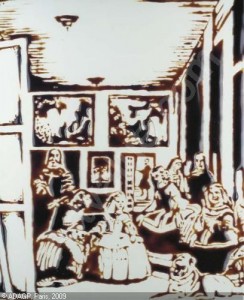- Attached to the essay "Dark Chocolate"
What is the power of chocolate?
Posted May 17, 2011 8:46 pm
The BBC, on April 16, 2007, reported on experiments on the effects of melting chocolate in the mouth that showed increased brain activity and heart rate greater than from passionate kissing – and lasting 4 times as long. “Psychologist Sue Wright said: “Chocolate contains phenylethylamine which can raise levels of endorphins, the pleasure-giving substances, in the brain. It also contains caffeine which has a stimulatory effect on the brain. This would explain why chocolate can give people a buzz, and why people can become addicted to it.” How credible this experiment was I have no idea.
Chocolate has even been used as an artistic medium. Here Vik Muniz, a Brazilian painter now living in New York, reproduces Las Meninas, Diego Velazquez’s renown 1656 painting—in Bosco syrup. The Velazquez painting dates from the height of King Philip of Spain’s reign, when chocolate, imported from Mexico and served as a sweet drink, became a court food craze.
Muniz often replicates the work of other artists in unusual materials, sometimes playing on the political significance of the medium, sometimes just playing. In an interview with Charles A. Stainback, he said, “Chocolate inspires a multitude of psychological phenomena: it has to do with scatology, desire, sex, addiction, luxury, romance, etc. I have never met anyone who didn’t like chocolate. Freud could probably explain why everyone loves chocolate.”
share
 site feed
site feed




Darien November 2, 2011 at 12:09 pm
Talking about addictive, Kristof had an interesting column in the Times the other day about the human capacity for addiction. It got me wondering about whether there is an adaptive reason why humans (and rats too, apparently, have a tendency to develop addictions to the degree that it rewires their brain chemistry.
Here’s the link: http://kristof.blogs.nytimes.com/2011/10/29/the-latest-in-brain-research-on-addiction/
Darien October 4, 2011 at 6:54 pm
I think it’s interesting to consider the fact that relative to European food culture, chocolate is relatively new. I believe, much like the tomato and potato, it was a new product brought over from the New World.
And yet, can you imagine a French pastry menu without it? It’s become ubiquitous to a degree that it’s hard to imagine that we ever existed without it.
I don’t know if that’s related to an innate quality in the food itself, or the nature of how it was adopted. Or both.
eliz October 5, 2011 at 5:27 pm
It’s true, We often think of the tomato and potato has having transformed European cuisine, but we forget about chocolate. Of course, the Europeans transformed chocolate too, when they added cream and sugar. Personally, I suspect it is something in its chemical make-up that makes chocolate so appealing, even addictive.